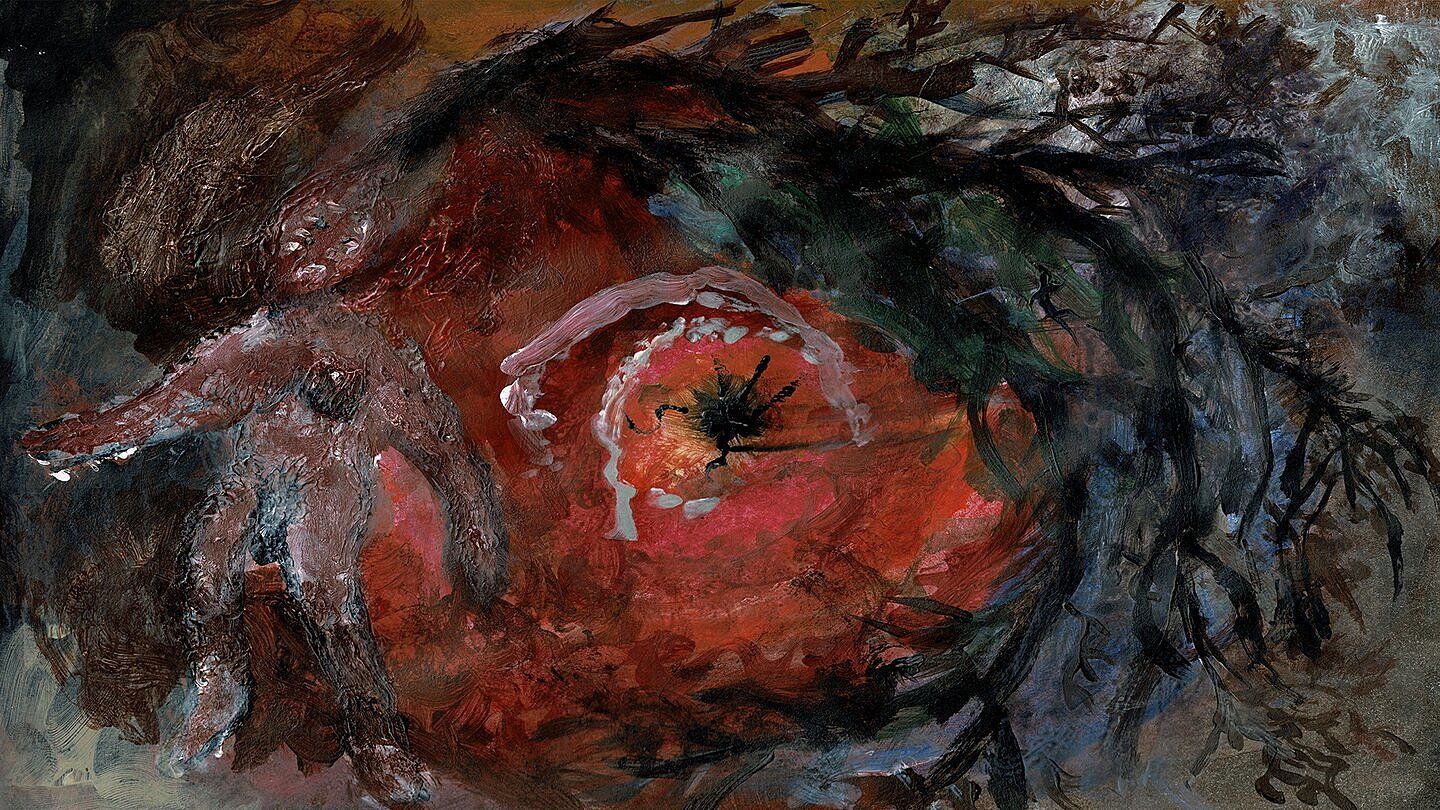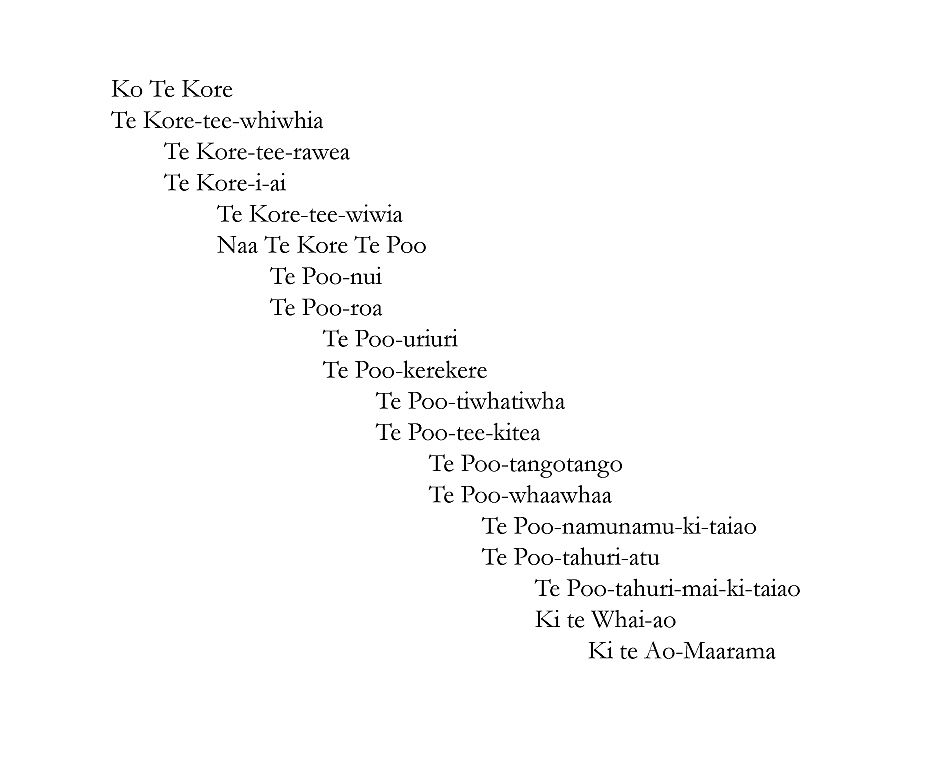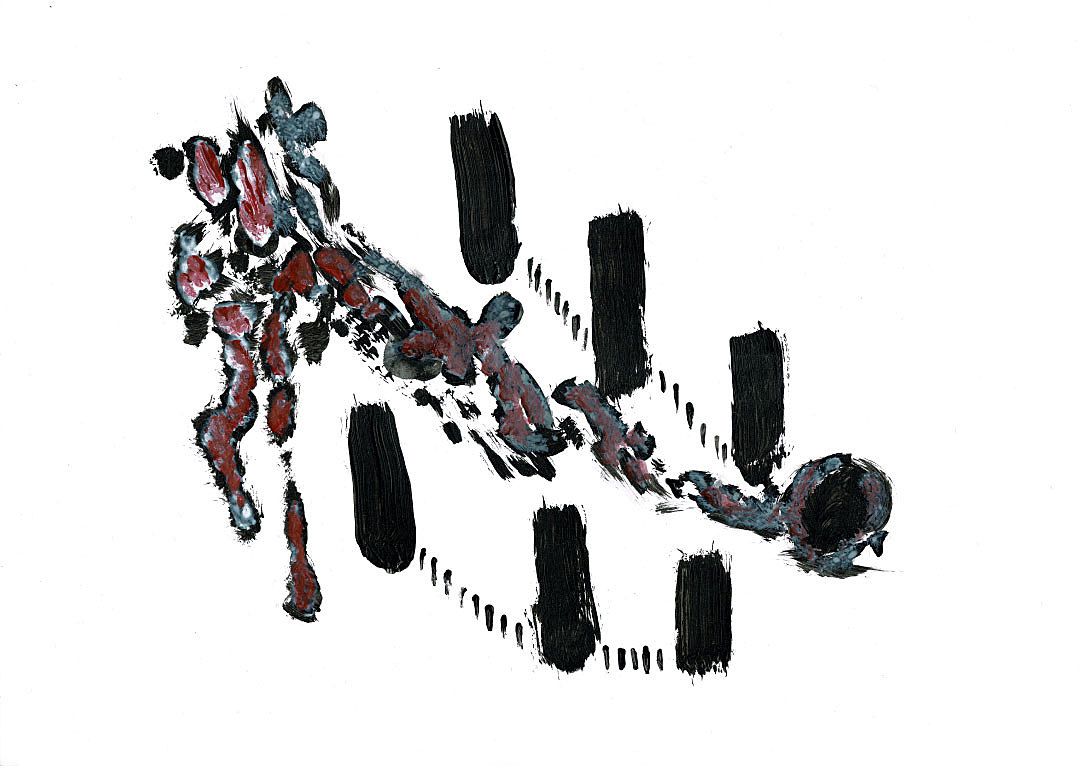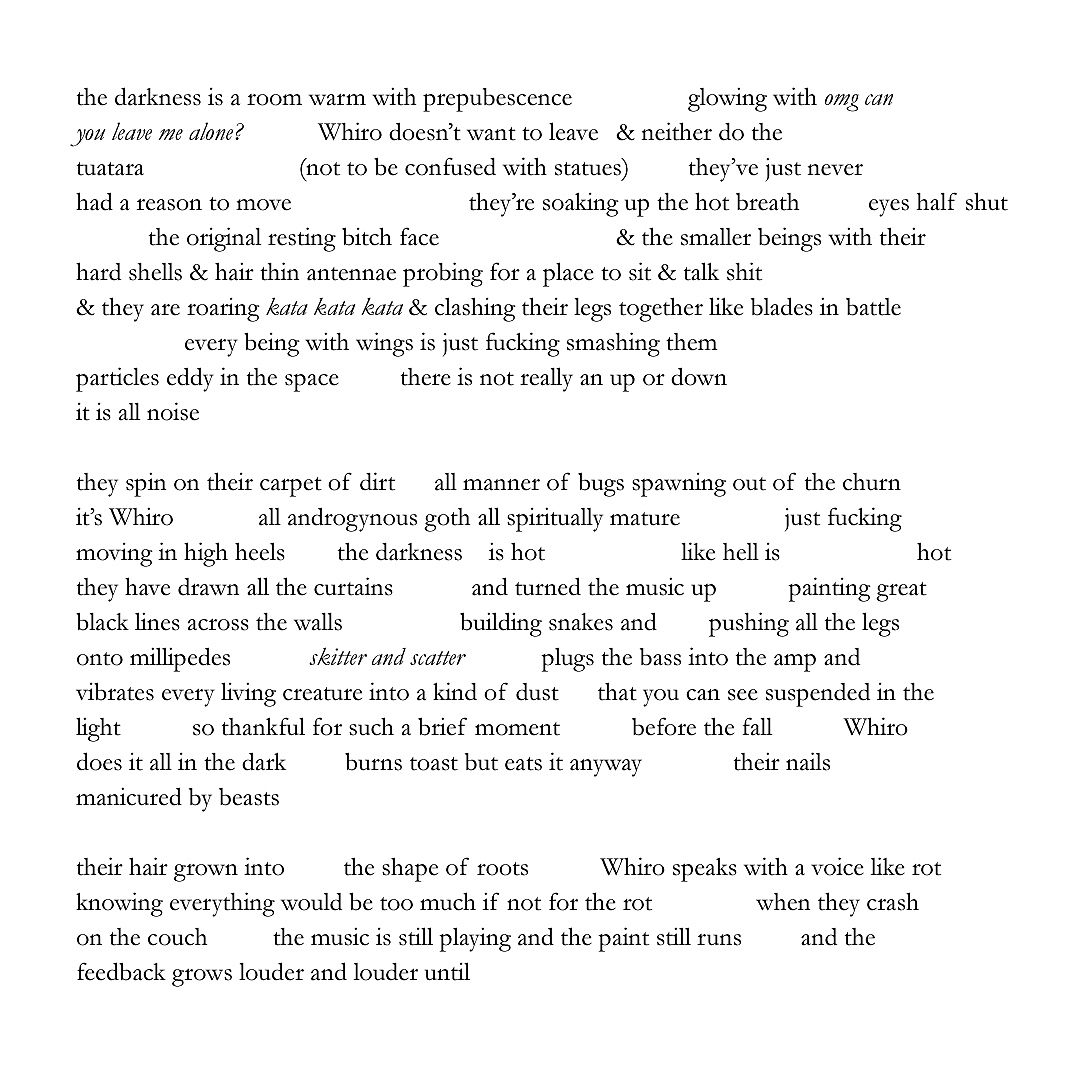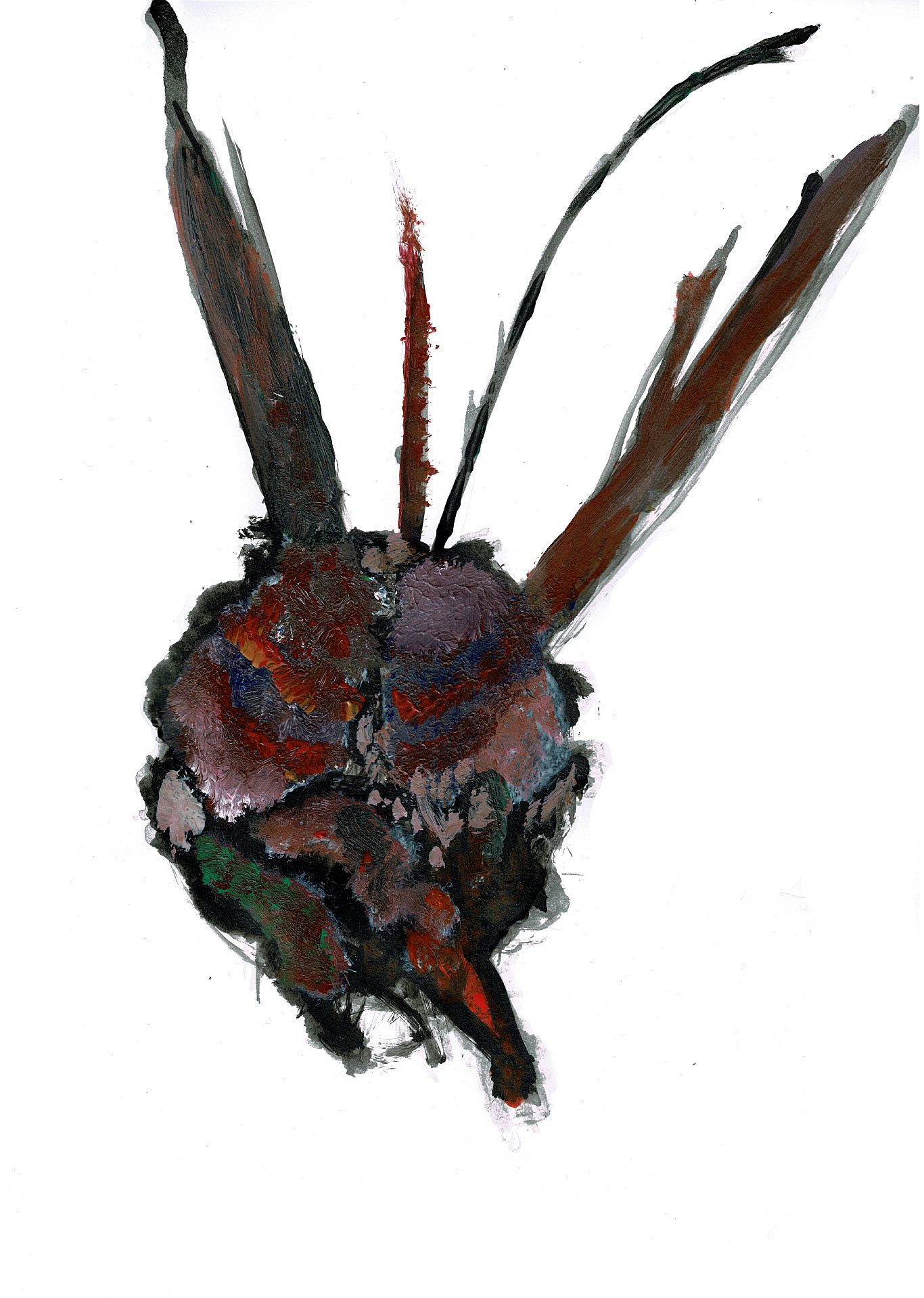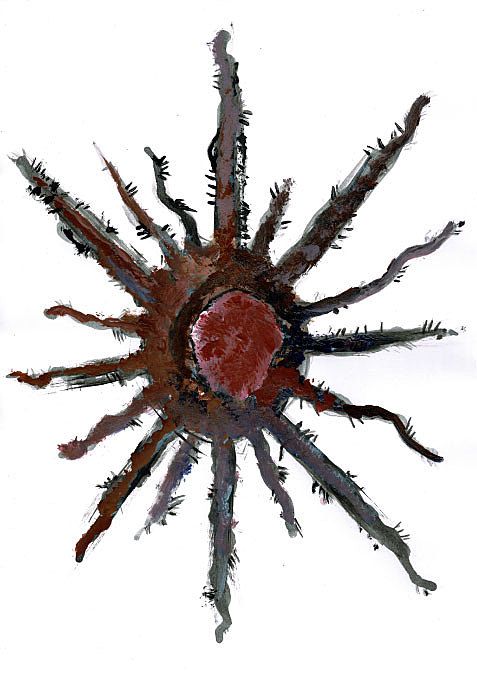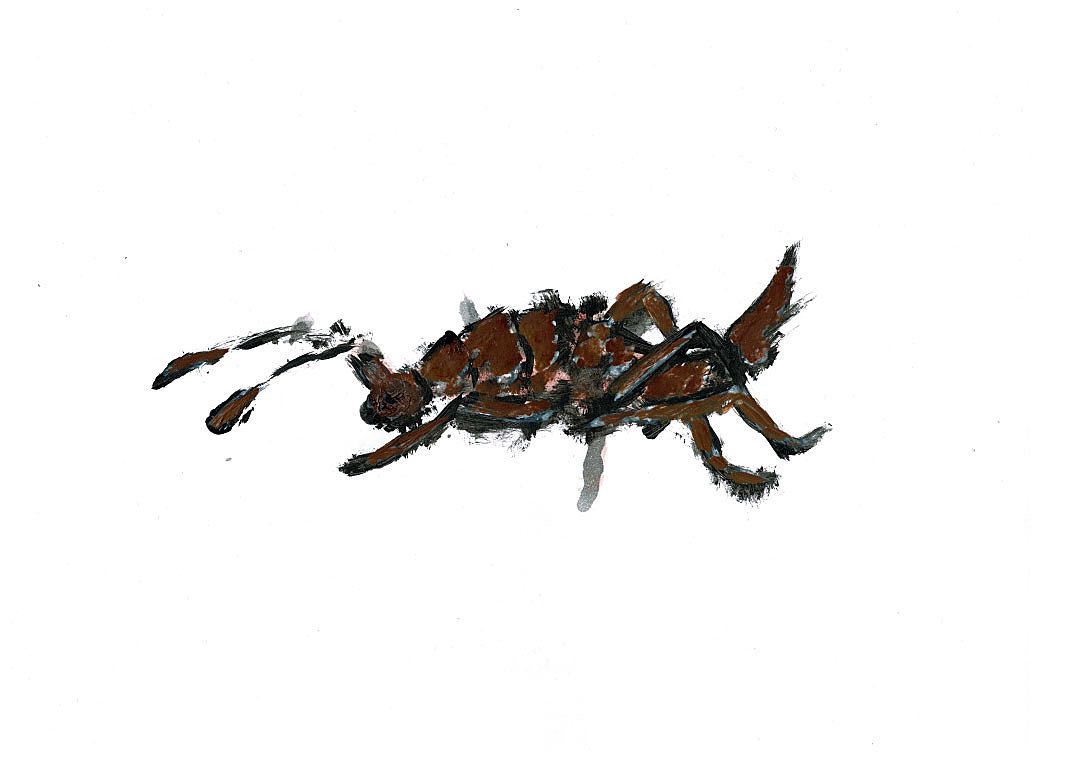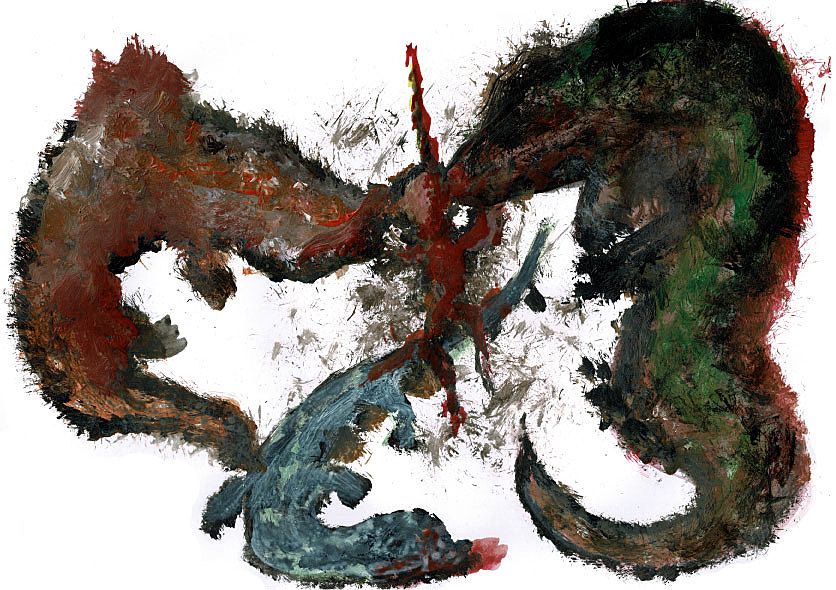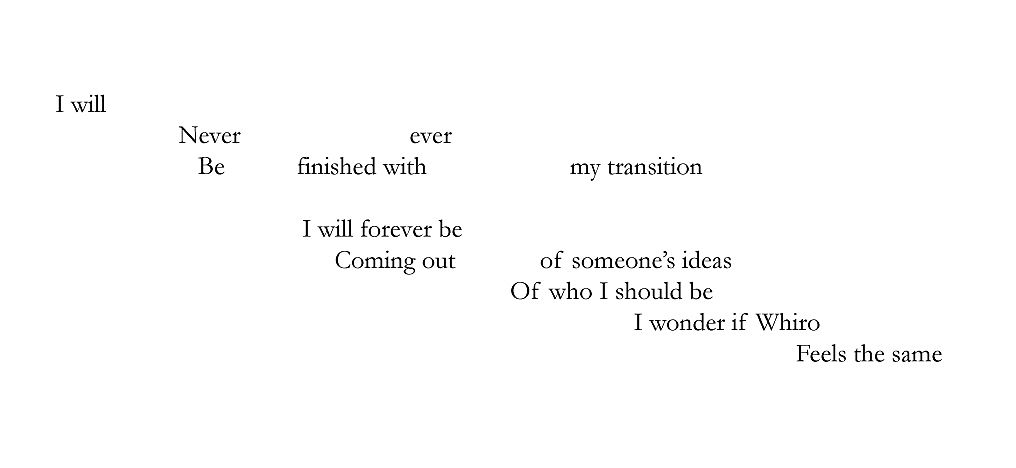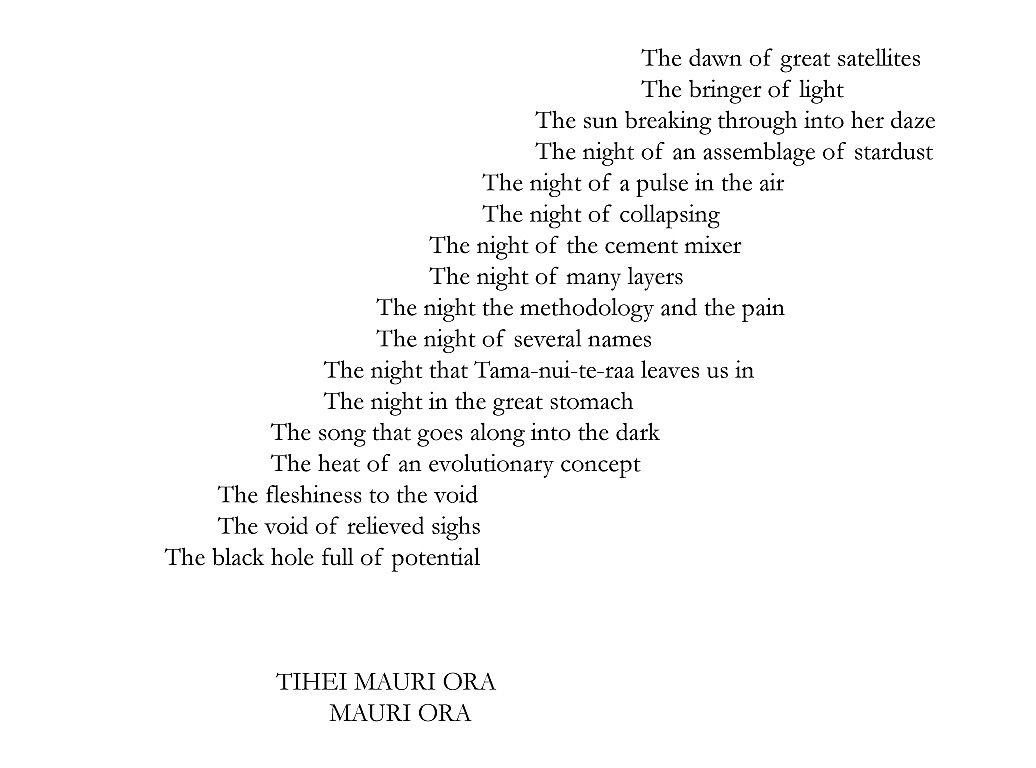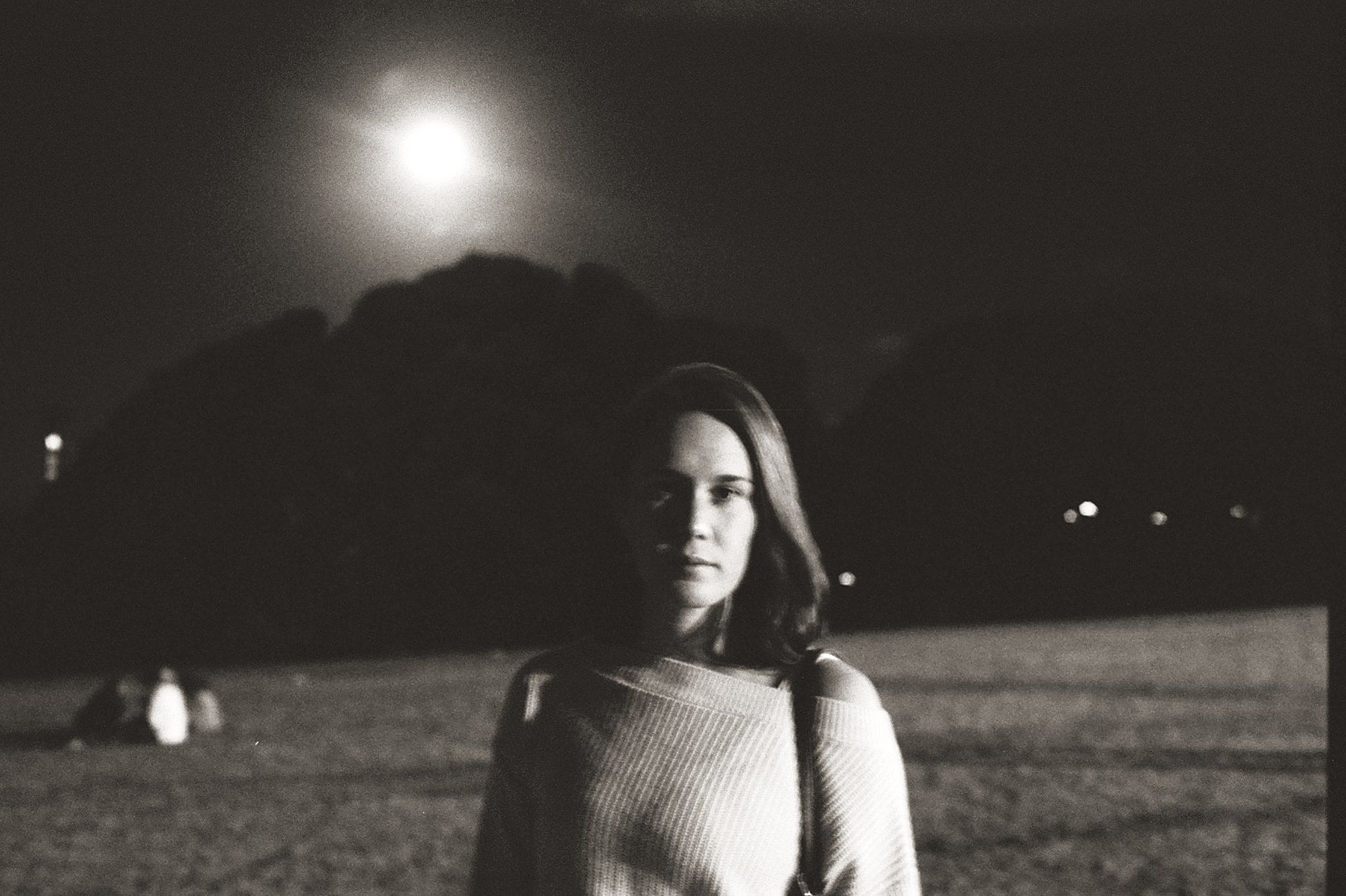Whiro in Their Original Glory
Whiro has an identity crisis. Michelle Rahurahu and essa may ranapiri kōrero on their own understandings of this dark Māori god: evil, chaos, the void, black holes, and ngārara included.
*
Michelle Rahurahu, Essa Ranapiri, Particles Eddy in the Space, 2021, acrylic on paper.
*
The many stages of the night, the many movements before the world of the light. And it seems we are drawn back to that monthly, that place of darkness where the moon is a black memory of itself. An app on my phone tells me this is the Whiro moon; at this point, I don’t know what that means. Not really.|
I cannot help but feel the breath of the missionaries on my neck as I search for clarity on Whiro. Many of our ancestors were converted to Christianity, including my tupuna Retimana Te Korou, who went by his baptismal name, Karaitiana. I am more familiar with the Holy Trinity than I am the Great Parents. I googled ‘Whiro, missionary’ and came up with Sarah Dingle’s thesis Gospel Power for Civilisation: The CMS Missionary Perspective on Māori Culture 1830-1860, which shares some of the diary entries of those missionaries, who refer to Whiro as Wiro:
Thomas Chapman declared to Maori that while they prayed to Wiro, who gave them “their hearts desire – filling them with all lusts”, they were “dead in trespasses and sins” and enslaved to such spiritual entities … The worship of Maori gods was often portrayed as a tyrannical reign, such as accounts of ‘bloody offerings’ to Wiro, whom the missionaries labelled ‘the evil spirit’ or ‘the devil’.
I remember Whiro coming up on social media because the ‘Evil’ tag was being hotly debated. Lots of people were piling on, “oh its whiro that’s why my day has been shit”, “fuck u whiro” (and from me, trying to be a smartass) “give nothing to Whiro”.|
We find our atua on the internet, usually through a tradition that paakehaa recorded. I, too, cannot help but fall back on a Christian framework. Rev Mr Yates, quoted in Elsdon Best’s writings, connects Whiro directly to Lucifer: “The ideas of the New-Zealanders with respect to Whiro, the evil spirit, are in some respects more in accordance with the Scriptural accounts of Lucifer, the Prince of Darkness.” When I hear Whiro I too think of Lucifer, but this does not fill me with puritanical disgust or loathing.
A correspondent once told me a story – which I’ve never been able to trace, and I don’t know whether it’s true – about a bibulous, semi-literate, ageing country squire two hundred years ago or more, sitting by his fireside listening to Paradise Lost being read aloud. He’s never read it himself; he doesn’t know the story at all; but as he sits there, perhaps with a pint of port at his side and with a gouty foot propped up on a stool, he finds himself transfixed. Suddenly he bangs the arm of his chair, and exclaims “By God! I know not what the outcome may be, but this Lucifer is a damned fine fellow, and I hope he may win!” Which are my sentiments exactly.
This quote is from a foreword that Phillip Pullman wrote to a reprint of the long poem Paradise Lost by John Milton. And I evoke it here to communicate the image that came into my head every time I read about Whiro. “Elsdon Best suggests that evil seems to have entered the world when the primordial parents were separated.” To the paakehaa that wrote about them they were clearly something of evil. But I felt like that hypothetical old man, on Whiro’s side, and I want the story from our ancestors mouths, not some coloniser’s hot take.|
Michelle Rahurahu, Essa Ranapiri, Androgynous Goth, 2021, acrylic on paper.
Milton created and ended the Christian Epic genre, and academics clenched and punched their fists. “Look how much intelligence Lucifer has; look how bulging and sexy he is,” they screamed in unison. Funny how The Great Man can have the last word and leave the whole room bursting with applause. If I’m quiet, I can still hear my university lecturers clapping. The social evolution of the Devil is said to have been birthed in pageants delivered by men in trade guilds that depicted the casting of Lucifer out of Heaven by having him barrel-roll down the slanted stage.|
I can hear it turning over and over.The wood clack.The crowd spitting furious and afraid.Because what is death but something to be utterly terrified by.But meat with the electricity fizzling out.|
Satan is apparently derived from the Hebrew word ‘śaṭan’, meaning adversary, and Whiro-te-tipua is, now, referred to as the ‘Lord of Darkness’ or ‘Whiro the demon’ in a Google search – Whiro meaning, among other things, demon, evil, bad – but Whiro also refers to the planet Mercury. I don’t know what precedes the other, the kupu, the planetary body, or the atua. Regardless, due to the narrativising of Christian missionaries they are conflated together now. Satan and Whiro: two big scary miscreants to take the heat of an evolutionary concept. It may seem simple to you to draw a straight line from
Chaos ------ Disease ------ Death ------ Evil ------ Sin
But disease is life. Chaos is populated. Black holes are less, nothing, and more, everything. How hoohaa, to carry the whole world’s pain, from the beginning to the end of time, only to be considered a hindrance. How hoohaa, to have been the older sibling, with all your wisdom and knowledge of the ways life can be, to be sanctioned to the worlds under this one. The recitation of evolution through the void, the darkness, the light, is a long one, and I imagine there will be a day when that recitation goes backward until we are tidily zipped into the void. Call it heat death if you like. Whiro is a recycler.|
There is something so astonishing about thinking of Whiro as a recycler. In her master’s thesis Te Paerangi: Darkness and Light in Māori Oral Tradition, Jessica Maclean extrapolates on Rangi Mataamua’s claims of Whiro’s kaainga being that of the black hole, imagining this as a space of new creation. “But recalling the association with Te Kore, is it not possible that matter within a black hole might, after all, exceed the speed of light and thus leave this universe behind? If so, this would provide the impetus for some new Te Kore, causing a new universe to be brought into being.”|
A new Te Kore. There’s something romantic in that. There could have been many chapters of life, many Te Kore; collapsing, reforming, collapsing again. Am I getting ahead of myself? Where does that leave Whiro as a bedmate of Lucifer?
The Hebrew Bible doesn’t talk about the casting out of the Devil; there is no Satan, and no Lucifer. If God, the creator of the world, and everything within, is so Good, then why did He create Suffering?|
And the Bible, in general, doesn’t posit Lucifer as the Devil at all! He was just the Son of the Morning, what Romans called Venus when it rose, thinking it was a separate heavenly body. And what does our thinking about Lucifer as Venus do to our imagining of him? Is he beautiful? Does he fuck? |He does now.| For the Romans, Lucifer was the bringer of light. Our name for this Lucifer is Taawera. We watch as Venus burns up in te ata; we watch as they transition into Meremere-tuu-ahiahi. She stands in the dark that Tama-nui-te-raa leaves her in. There are so many ways our traditions reflect our complicated world and so many ways Christianity has reduced those traditions down to fit into a colonial worldview. I guess if you’re putting everything in a carry-on, then it has to be packaged down, right? The pain of being confined into the mind of a white man.|
C S Lewis put himself in a real tailspin when he wrote The Problem of Pain, about the presence of Evil in a Christian mind. It’s the first thing I asked when I started going to youth groups – “If God is so Good then why is there suffering?” A better question might be, “If God is so good, why are His churches exempt from tax?” My lazy reading of The Problem of Pain is that Lewis basically says, if you can logically explain why you’re an atheist, then you can logically explain why you aren’t. It’s an argument that sounds like it’s coming from that one ‘Devil’s advocate’ guy in your class… Okay, I admit that I was the Devil’s advocate guy in your class. But it’s fun to play that role sometimes. It’s fun to read and laugh with a new friend about weird men who you actually feel really close to, with the waves laughing along at your feet (do you remember that Essa?)|
(I do! Did I also joke about how drinkable the moana looked? Even if it was, I'm sure Tangaroa or Hinemoana would have some beef with me sucking up the ocean.)|
Very lush. I think Hinemoana would forgive us. I don’t know about Tangaroa though – he’s always trying to get my niece to come swim with him. A kaiako once told me that our ancestors didn’t pray to our atua so much as request they leave them alone, or make incantations filled with hope that they would survive them.|
a figure standing there in the tides
they are letting their whenua back into the sea
Papatuuaanuku kisses Hinemoana’s side
they are standing there
in the tides
they tremble with the knowledge that
their gods are not something to witness
up this close
and feel safe
|It’s funny acknowledging these figures in my life now. I walked away from Christianity a long time ago (I only really walked towards it for the club sandwiches and the will to live), and now I guess some might call me a born-again Maaori. I know many people who hold both. Takoto ana au, I look to the moon, I wait for it to tell me how I’m going to feel tomorrow, wait for it to feed me. Should I toil over the earth today? Or should I toil over myself? If I look at instructions from my tuupuna and see “bad day to plant seeds”, it’s just a bad day to plant seeds, nee? The value of the day isn’t diminished. A Whiro moon is a bad day for planning ahead but a good day for ensnaring eels in intricate traps. Before I go to Rarohenga, should I ask my family to burn me so that Whiro will not gain sustenance from my soul? Or should I go fully intact and take one of the earrings I made from my own extracted teeth and say, “Don’t need these anymore, Whi! Eat up!”
I didn’t understand before doing my reading that Hine-nui-te-poo’s role in our puuraakau is to assist in the newly developed concept of ‘mate’. Wairua and tinana were being sent to Rarohenga attached together, and Whiro gobbled them up indiscriminately. Hine-nui-te-poo saw that the natural, compostable flesh of our bodies needed to be separated before they were sent to Tai-Wheetuki. She splits the compostables from the non-recyclables and walks onward, our wairua, like a styrofoam cup, in her hands.
It’s as natural as breathing to condemn older beings on their ways and want to draw a line between them and us. We have never lived before, so this feels infinite. It isn’t. People say they are waiting for the racists to die out, not understanding that those ideologies will last as long as plastic. We can pretend putting them in a yellow bin makes them disappear, but the reality is they are shipped off to another place and sit in piles for hundreds of years. Whiro can't do all the mahi for you.|
when the world ends
as all things must
you will be there to bring us together
inside your great stomach
and I for one
won't mind
quenching hunger
for a change
because I for
one won’t mean
anything
back home
Michelle Rahurahu, Essa Ranapiri, Spawning Out of the Churn, 2021, acrylic on paper.
|I saw a clip of Stephen Fry arguing against Christianity. He said something like, “Did you know there are little mites that bore into the eyes of children? What kind of God would create that?” That argument ignores the perspective of the mites. Are the mites evil? Evil starts to sound like a placeholder after a while, like treason. How can you read the inner motivations of mites? I look at my cat sometimes, and the words “Awh, she loves me” slip out of my mouth without thinking. I want a soft, purring creature to love me, and I make it so.
A mite takes one measly munch out of an eye, and it’s a reprobate. A mite can’t be neutral. God can’t be neutral. He is good, and the reason why there is bad is this convenient sinner shoved into the discourse like the hand of a nervous pickup artist into a khaki pocket. Humans are nasty little things. They’ll walk into a gorse bush then burn the whole crop over one scratch.
And then we have Whiro. It’s convenient that Whiro gets thrown in prison, aye? It’s convenient that there’s a primordial example of closing those ‘evil’ characters in a secluded area. There weren’t rehabilitation centres, even for the atua. Mites, Whiro, villains, criminals. Lock them up or exterminate them.|
This is something that unsettles me. And doesn’t quite make sense. If Whiro was locked away, then what is everything about them that exists in our world doing here? And also, why would they have been locked away? My limited knowledge of utu and limited knowledge of Whiro makes me think that they are where they want to be. In a dark place. They never wanted Papatuuaanuku and Ranginui to be split. I don’t see anything evil in wanting the world to be different.|
It didn’t surprise me in the least to see arguments online against the casting of Whiro as ‘evil’ came mostly from waahine maaori like Amber Craig, who tweeted:
… the misconception that Whiro is evil is wrong. Everything must have utu. Whiro provides a role. We can’t run at 100% energy and have all the highs without lows and caution and low productivity days. It serves a purpose.
Who knows the pain of being cast in darkness better than waahine maaori?
My tuakana will jump up and down when they hear the tale of Hinepuukohurangi and Uenuku, like, “What the fuck? She just never gets to go home? That’s it?” Infuriated at the telling of a story that seems to reinforce the shape of a wahine as a reward or a pawn. I reject the idea that these waahine were merely objects (seen in the provision of Muriranga-Whenua’s jawbone, Mahuika's fingernails and Hine-tuu-a-hooanga’s back). The story of Hine-nui-te-poo has more agency, more choice, but the decision to sacrifice herself is dominated, colonised, burdened by the assumption of suicidal tendencies.|
“She having assessed the situation and the possible responses, determines her future and becomes a goddess” is a wonderful quote from Jessica Maclean’s ‘Goddesses and Grandmothers’, published in Atua Wāhine. It highlights her agency and her sense of responsibility and understanding of a world freshly made.|
Would an assemblage of stardust consider shifting to another dimension as death? Hine-nui-te-poo didn’t die; she transcended, willfully. I wouldn’t be so bold as to say that I’ve transcended like our whaea Hine-nui-te-poo did, but I am not the same matter that existed 20 years ago in the form of Michelle. I am not dead.
I believe it is in the hands of waahine maaori to recolour or to add to these stories and reveal a higher purpose for these waahine – and they have been doing so forever – everyone has a tuakana like mine in their homes, screaming, “KAAORE”. I’m limited by my discussion of it even now, with the binary of waahine/taane. I don’t know how our tuupuna acknowledged sex, gender, trauma, good and evil. Women, taahine, Takataapui have been battling the concept of evil layered onto their bodies since the arrival of that full-rigged British vessel. Inside every person is a panopticon, sterile and white.
I’ve lost a little bit of that multi-layered, multi-dimensional perspective of self in my journey through life. I believe there are more gender diverse, Takataapui tales to be told (following the example set by Ngahuia Te Awekotuku’s Ruahine, and of course your mahi, Essa) to recolour those who contain multiplicities in their story, in the whakapapa within their own lives. In the wise words of my tuakana, “I don’t care if Tutanekai was bi, but I am.” That declaration says so much to me; when our history is obstructed by the narratives of colonisers, we can look to ourselves because there is that central pole, that umbilical cord of whakapapa connecting us directly to our ancestors.
We are living tuupuna. That is not to say that I don’t look for wisdom from our ancestors. I find traditions that resonate all the time, like the tradition where you had several names throughout your life based on your actions, not the shape you had at birth, if only to recognise that consciousness is always shifting. I would like to shift, I would like to have layers, I would like to have a choice.|
There is a fleshiness to the void
Space is nothing but full of bodiness
A structure that has blood run
Through it
And we raise our arms
Our veins swinging
Out and up like fingers
To catch our god
So quiet
Here
It can be hard to know what is a part of you and what is something to cast off. I came to my womanhood late, and in a Western sense, I still don’t think that word applies. I am a nonbinary wahine. It is all a part of how I am and want to be and be seen by my ancestors. I’m sure Whiro would get it. The idea of being all potential, of sitting at the keyboard and not knowing what will come out. The curtains are drawn, and the windows are open. It’s muggy here in Kirikiriroa. It is the Whiro moon, and perhaps I shouldn’t be writing at all, but it feels right. It’s not a good time for fishing or planting, but what about weaving? There is something of a pulse in the air, something of a poise and a pause. It’s like the moment before coming out. The seconds before Tane really kicked the universe into being. There is so much of this paakehaa world that makes us feel small, that seeks to contain us. The gendering of our atua feels like another way of being crushed into the cement mixer of colonial heteronormativity. We’re spinning now in so much unrelenting solidity. Even the angels in Paradise Lost don’t have a gender. To paraphrase C S Lewis, THEY CAN’T BE GAY BECAUSE THEY’RE NONBINARY.|
Mwahahahaha I remember us talking about C S Lewis, and you said he “came to Christianity late and was really gay about it.” I think about that koorero a lot, about how I told you I was going through second puberty; I was just starting to try out my goth look. I think of that koorero, and I’m laughing with you at Devonport again, the waves laughing along with us.|
What a funny man. And despite the stuffy recontextualisation of his work, Milton was anti-monarchist so I would like to think (naively) that he would be on our side when we say FUCK THE CROWN and LANDBACK. Milton was a blind man when he wrote Paradise Lost, so it was written from dictation; there is an oral tradition of its own kind embedded in that text.|
We all have music in our stories. Maaori just recognise its vitality. Once upon a time the Britons swore that the planets were held by rings and the sound of each ring passing by another would resonate in the cosmos, like a bow drawn over a string. That’s how you knew there was harmony.|
It reads like a song that goes along into the dark.|
Michelle Rahurahu, Essa Ranapiri, The Smaller Beings with Their Hard Shells, 2021, acrylic on paper.
The thing I lament about Whiro’s story as a primordial sibling is their association with critters. Whiro’s children, or allies, or kin, are ngaarara, which can mean insect, reptile, bug, bacterium and monster. Dr Mere Roberts writes in Sacred Species and Sites: Advances in Biocultural Conservation:
Because of their spiritual association with Whiro, the god of all things evil, lizards are feared and ‘set apart’. These attributes also provide the basis for their role as kaitiaki or guardians of sacred objects and places. Live tuatara were often placed at the entrance to burial caves in which were hidden the bones of the dead, while charcoal drawings of lizards within the cave interior provided further spiritual enforcement … In each case, lizard guardians provide physical as well as spiritual protection of the life force or mauri which sustains the vitality of all things.
Each body has the potential to harm and heal. My blood can transmit disease to others as well as support the mauri of others. My hands exist as tools that can both hit and hold. For our tuatara or moko kakariki, they have the potential to be protectors or harbingers of death. |
The plum tree at the back of our house has been split in two by the wind. Its centre all soft and rotten wood. I go to pull the dead bark off. The tree is still alive on both sides of the cut, a weetaa crawls out. The bigger ones are the females, according to Wikipedia. I show her light that she doesn’t want. The sun breaking through into her daze. I see her lingering, thorax revealed to the air; I hope a bird doesn’t get her, now that I’ve ruined her home. Is this more torment from Taane? Should I stop trying to map a soap opera onto the natural world?|
We look at those fine creatures with strange eyes and bodies, and they look back at us, perhaps surveying the ugliness of the human body: squishy and bumbling, it has no skill for dodging around blades of grass, practically inept. Yeah, Matua Ngaarara. True.|
Michelle Rahurahu, Essa Ranapiri, Their Nails Manicured by Beasts, 2021, acrylic on paper.
I think about my body and the way hair sprouts tufts all over it. Like antennae. Like pubic hair all over. Some wrongness. My hair like useless antennae or insect legs warped and weaving. I read a book about suicide.
It ends with the advice; if you’re thinking about taking your own life, don’t.
It’s somehow more convincing for all the detail the book goes through. The methodology and the pain. I laugh, and the main character gets back up again. I laugh and laugh into that dark book into that World of Nothing-will-get-better-again until it does.
*
|I was very much like Whiro’s nocturnal critters in my teens; most of my expression happened at night when the door to my bedroom was closed, and I was sure everyone was asleep. I had a routine where I took a shirt cut into ribbons and bound up my thorax, so it sat flat and aerodynamic. I danced in my room at night like a fly being repeatedly sprayed with poison. I had no eyes. It was bliss.
I eventually summoned up the courage to shave my head on my 16th year of living, to start affirming how I felt in the dark, and the first time shower water made contact with my freshly bald skin, I laughed. The sensation of droplets hitting an uncushioned scalp is like, I don’t know, like what Jesus would have wanted, lol. I like to imagine it’s the same exaltation that weetaa feel when they climb up from their underground burrows and their heads are anointed with the
first
drops
of evening
dew.
|I wake up with a pain in my back; I roll over. My eyes shut. Time passes weirdly in a dream. I'm walking backwards through the dark. The light slowly creeps through the gap in the curtains. A thin line filling up with what a new day means. I think about the good and the bad, how unproductive doesn't mean evil unless you think of the world in terms of productivity. Of, this must be done now and quick. Of keep making and making and making until the word profit turns into deity itself. No, our ancestors must have had space for those days where staying still, where wrapping yourself in warmth and living with the dark was a valid option. I dwell on Whiro and desire for a return to that state of potential. As tangata Takataapui that space of Te Korekore is everything.|I want to have layers, I want to shift.|
Elsdon Best meant Whiro as a threat. Some great beast consuming their people until one day they bash through the ceiling of the underworld and bring about the end. |Will it really be the end? Do you promise?| I think of the Big Crunch and how one day all matter will collapse back into itself. A return to the state of potential. |Why is it only a happy ending if we are in it?| Our ancestors know what's up. I think Whiro just wants us to rest. I think of Hine-nui-te-poo and how long her duty has played out. How many people has she guided over the threshold? I think, doesn't she deserve a rest one day too? |Put your feet up, Aunty.|
Papatuuaanuku and Ranginui embracing again, Taane only able to hold them apart for a cosmically short while. The life of Maaui a model of how short our times here must be. We touch each other in places that make us mortal. We turn into great satellites and swing out into space. When the lights are out we can fill a room! When we fuck do our ancestors fuck with us? Does the ragged puritanism of a distorted book become so many unread pages? Does Whiro watch with hunger for bodies? The lethargy of intimacy and firing off of dopamine. “What a snack,” they think. What a model for Papatuuaanuku and Ranginui to fall back into the rhythm of.
*
